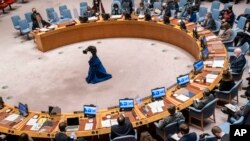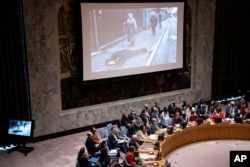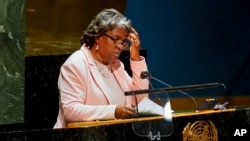Nearly 40 countries plan to bring a draft resolution to the U.N. General Assembly that seeks to hold the five veto-wielding countries in the Security Council accountable when they exercise that right.
If adopted, the resolution would require the General Assembly to meet when one of the five permanent Security Council members — Britain, China, France, Russia or the United States — uses its veto to block adoption of a council resolution.
Liechtenstein, which is leading the move, said on its Twitter account Tuesday that the co-sponsors will formally present the text next week with hopes for an early adoption in the General Assembly.
“The resolution is a meaningful step to empower the GA and strengthen multilateralism,” Liechtenstein said.
The General Assembly has recently played a high-profile role convening an emergency special session and highlighting Russia’s international isolation for its war in Ukraine.
In two votes in the General Assembly, Moscow found itself condemned for its invasion and also called upon to allow humanitarian aid into Ukraine. Both votes happened after Russia blocked action in the Security Council — once with its veto, and the second time with the threat of using it.
In a third vote last week, the assembly took the extremely rare move of suspending Russia from the U.N. Human Rights Council.
In an address to the Security Council one week ago, Ukrainian President Volodymyr Zelenskyy scolded the 15 members for not carrying out their mandate of maintaining international peace and security, and he called on the U.N. to reform or dissolve.
The United States supports the Liechtenstein-led measure and is one of the group of co-sponsors.
Ambassador Linda Thomas-Greenfield said in a statement that there are times when one of the five decide a particular resolution will not advance international peace and security and will cast their veto, but they should be ready to explain their decision.
“Unfortunately, not all members of the Security Council share this sentiment,” Thomas-Greenfield said. “We are particularly concerned by Russia’s shameful pattern of abusing its veto privilege over the past two decades, including its vetoes to kill a U.N. observer mission in Georgia, block accountability measures and chemical weapons investigations in Syria, prevent the establishment of a criminal tribunal on the downing of flight MH-17 over Ukraine, and protect President Putin from condemnation over his unprovoked and unjust war of choice against Ukraine.”
The United States has used its veto on at least a dozen occasions since 2000, on resolutions related to the Israeli-Palestinian conflict. On another occasion in 2002, Washington vetoed a resolution related to the renewal of a U.N. peacekeeping mission in Bosnia that included language on the immunity of U.S. peacekeepers from the jurisdiction of the International Criminal Court.
Russia (and before that, the Soviet Union) has made frequent use of its veto. In recent years, China has joined Russia on multiple occasions to block measures related to Syria’s war. Britain and France have not cast a veto since 1989.






